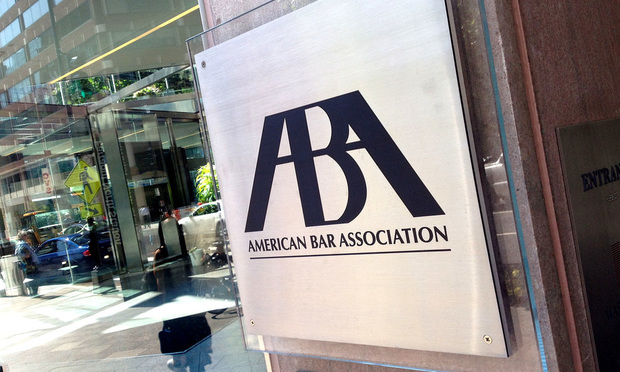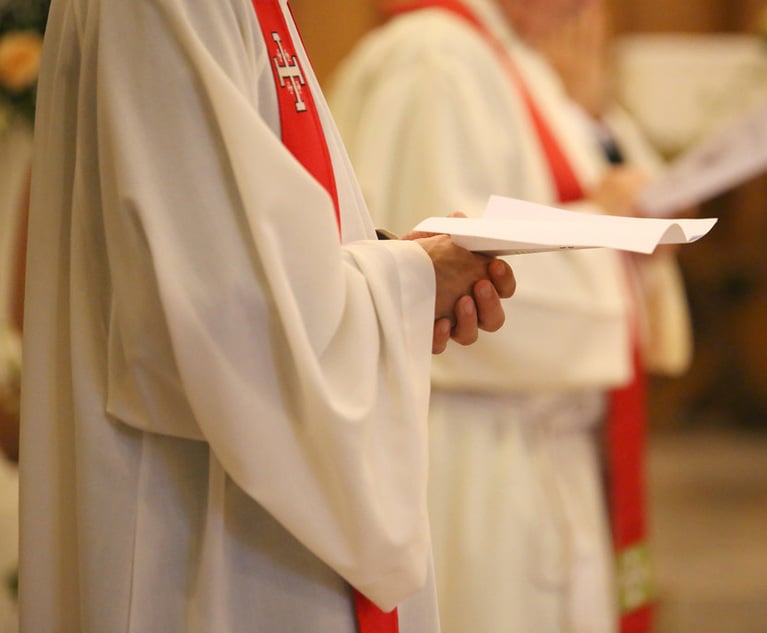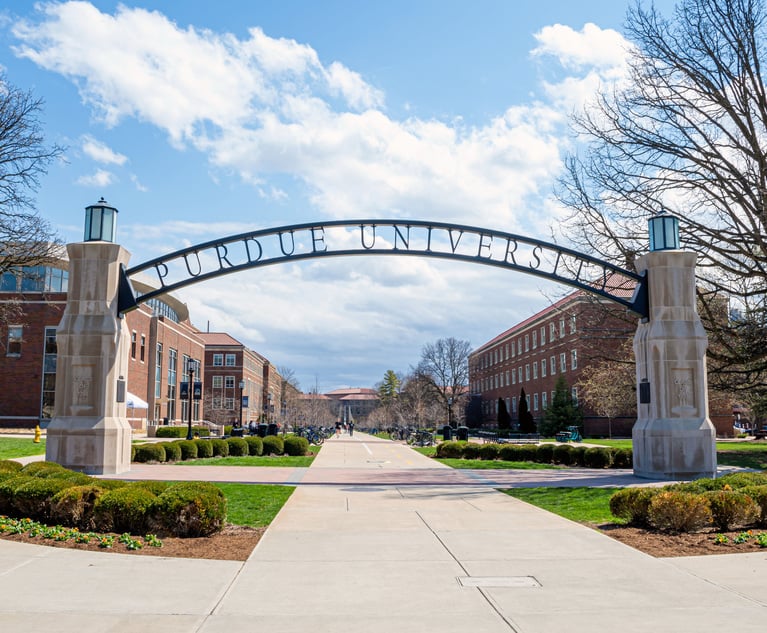ABA Council Contemplates Expanded Powers, New Distance Ed Rules
The ABA has been discussing changes to its distance education approval process for months, but uncertainty over what legal education will look like in the fall is putting an even brighter spotlight on proposed reforms.
May 12, 2020 at 03:29 PM
6 minute read
 Photo: Diego M. Radzinschi/ALM.
Photo: Diego M. Radzinschi/ALM.
The American Bar Association began mulling changes to its law school accreditation rules surrounding distance education long before COVID-19 forced all classes online this spring.
But the question of how to regulate remote learning has become particularly relevant and pressing with administrators contemplating what legal education will look like next academic year if the pandemic prevents in-person classes from resuming.
Distance education standards take center stage May 15 when the ABA's Council of the Section of Legal Education and Admissions to the Bar meets virtually to discuss modifying the way it approves programs that fall outside the traditional in-class format.
The ABA has characterized the proposal as a modest change that won't drastically alter how such programs are approved, but others believe it will prompt more schools to pursue online J.D. programs under the belief that they will encounter less accreditation red tape.
The council also will consider a proposed rule change that would expand its ability to suspend specific accreditation standards amid regional and national emergencies, including pandemics and weather disasters. That proposed rule would authorize the council to "adopt emergency policies and procedures in response to extraordinary circumstances in which compliance with the standards would create or constitute extreme hardship for multiple law schools." The council took a step in that direction in March when it issued a guidance memo that cleared the way for law schools to exceed the existing limits on distance education during the spring semester, but the proposed rule goes further.
"The proposed change is necessary because we are unsure of what the fall semester will bring with the COVID-19 pandemic, or what the Department of Education will permit accreditors to do to meet the continued emergency," reads a May 8 memo from the ABA standards review committee, which has recommended putting the matter out for notice and comment. Any final adoption of the change would require the approval of the ABA's House of Delegates, which next meets in August.
The ABA was able to waive the distance education limits for the spring semester under an emergency directive from the U.S. Department of Education, said William Adams, the ABA's managing director of accreditation and legal education. But that directive is set to expire in June, and it's unclear whether it will be extended.
"When [the COVID-19 pandemic] happened, we realized that, in any kind of emergency, we don't have the ability to extend a waiver of our distance education limits to schools," said Adams said. "This gives us that ability."
The memo clarifies that the proposed rule change could not be leveraged to give individual schools the ability to bypass specific accreditation standards. Rather, it's intended to issue broad relief from specific accreditation standards on a temporary basis, for the duration of the triggering emergency.
While that proposed rule change emerged just last week, the matter of how the ABA oversees distance education has been percolating for months. On Friday, the council will weigh whether to move its review of distance education programs from the "variance" process to the "substantive change" process. The terms may be technical, but essentially the proposal, if approved, would slightly reduce the amount of regulatory hurdles law schools encounter when launching distance education programs that exceed the limits of the current standards.
The proposal would eliminate Standard 306—a standalone standard that lays out the parameters of what constitutes a distance education class and spells out the limits on the number of credits a student may earn in such classes. It doesn't eliminate those rules, however, but it incorporates them into other standards.
Students will still be limited to earning no more than a third of their credits through distance education—with no more than 10 credits coming in their first year. Classes still count as "distance education" courses if more than a third of the content is delivered remotely. Any school seeking to exceed those limits would have to go through the substantive change process, should the council adopt the proposal.
The significance of the proposed elimination of Standard 306 depends on whom you ask. Adams downplayed the change, saying the council will essentially consider the same factors when reviewing distance education applications it receives under the substantive change process.
"Practically, it probably doesn't change anything about how the council will review programs," he said. "The factors that the council will look are exactly the same. It probably reduces the paperwork a little bit for schools. The intent of the change wasn't to make it easier for schools to get these programs approved."
But Andrew Strauss, dean of the University of Dayton School of Law—which launched a largely online J.D. program in 2019—said he sees the proposal as an "inflection point" that is likely to prompt many more law schools to offer online J.D.s (There are currently nine such programs in operation, three of which obtained variances from the ABA.)
"The ABA Council's procedural vote to rescind the 306 prohibition comes right after every American law school went all online in response to the COVID crisis," Strauss said. "Though the emergency circumstances made for a messy transition, many professors experienced the kinds of benefits online legal education can provide. So, if the ABA does ultimately make this very desirable change, I think you will see more schools adopting largely online J.D. programs in the future."
Adams agreed that law schools, many of which have thus far shown little interest in distance education programs, may be more interested in launching online J.D.s now that they have seen what's possible through remote education. That exposure is likely to influence their decision far more than changes to the ABA's approval process, he said.
The council is also slated to discuss a proposal by the Society of American Law Teachers that it suspend enforcement of its bar pass standard during the coronavirus outbreak. That rule mandates that at least 75% of a school's graduates pass the bar within two years, or the school risks losing its accreditation. SALT's letter argues that the pandemic's upheaval of the bar exam this July means that pass rates will not be an objective measure of law school quality.
This content has been archived. It is available through our partners, LexisNexis® and Bloomberg Law.
To view this content, please continue to their sites.
Not a Lexis Subscriber?
Subscribe Now
Not a Bloomberg Law Subscriber?
Subscribe Now
NOT FOR REPRINT
© 2025 ALM Global, LLC, All Rights Reserved. Request academic re-use from www.copyright.com. All other uses, submit a request to [email protected]. For more information visit Asset & Logo Licensing.
You Might Like
View All
Librarian's Termination Violated First Amendment Protections, Lawsuit Claims
3 minute read
After Shutting USAID, Trump Eyes Department of Education, CFPB

Divided State Supreme Court Clears the Way for Child Sexual Abuse Cases Against Church, Schools

Longtime Purdue GC Accused of Drunken Driving Hires Big-Name Defense Attorney
3 minute readTrending Stories
Who Got The Work
J. Brugh Lower of Gibbons has entered an appearance for industrial equipment supplier Devco Corporation in a pending trademark infringement lawsuit. The suit, accusing the defendant of selling knock-off Graco products, was filed Dec. 18 in New Jersey District Court by Rivkin Radler on behalf of Graco Inc. and Graco Minnesota. The case, assigned to U.S. District Judge Zahid N. Quraishi, is 3:24-cv-11294, Graco Inc. et al v. Devco Corporation.
Who Got The Work
Rebecca Maller-Stein and Kent A. Yalowitz of Arnold & Porter Kaye Scholer have entered their appearances for Hanaco Venture Capital and its executives, Lior Prosor and David Frankel, in a pending securities lawsuit. The action, filed on Dec. 24 in New York Southern District Court by Zell, Aron & Co. on behalf of Goldeneye Advisors, accuses the defendants of negligently and fraudulently managing the plaintiff's $1 million investment. The case, assigned to U.S. District Judge Vernon S. Broderick, is 1:24-cv-09918, Goldeneye Advisors, LLC v. Hanaco Venture Capital, Ltd. et al.
Who Got The Work
Attorneys from A&O Shearman has stepped in as defense counsel for Toronto-Dominion Bank and other defendants in a pending securities class action. The suit, filed Dec. 11 in New York Southern District Court by Bleichmar Fonti & Auld, accuses the defendants of concealing the bank's 'pervasive' deficiencies in regards to its compliance with the Bank Secrecy Act and the quality of its anti-money laundering controls. The case, assigned to U.S. District Judge Arun Subramanian, is 1:24-cv-09445, Gonzalez v. The Toronto-Dominion Bank et al.
Who Got The Work
Crown Castle International, a Pennsylvania company providing shared communications infrastructure, has turned to Luke D. Wolf of Gordon Rees Scully Mansukhani to fend off a pending breach-of-contract lawsuit. The court action, filed Nov. 25 in Michigan Eastern District Court by Hooper Hathaway PC on behalf of The Town Residences LLC, accuses Crown Castle of failing to transfer approximately $30,000 in utility payments from T-Mobile in breach of a roof-top lease and assignment agreement. The case, assigned to U.S. District Judge Susan K. Declercq, is 2:24-cv-13131, The Town Residences LLC v. T-Mobile US, Inc. et al.
Who Got The Work
Wilfred P. Coronato and Daniel M. Schwartz of McCarter & English have stepped in as defense counsel to Electrolux Home Products Inc. in a pending product liability lawsuit. The court action, filed Nov. 26 in New York Eastern District Court by Poulos Lopiccolo PC and Nagel Rice LLP on behalf of David Stern, alleges that the defendant's refrigerators’ drawers and shelving repeatedly break and fall apart within months after purchase. The case, assigned to U.S. District Judge Joan M. Azrack, is 2:24-cv-08204, Stern v. Electrolux Home Products, Inc.
Featured Firms
Law Offices of Gary Martin Hays & Associates, P.C.
(470) 294-1674
Law Offices of Mark E. Salomone
(857) 444-6468
Smith & Hassler
(713) 739-1250








